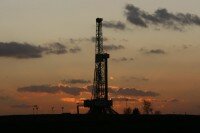The climate case for shale gas
Posted in Policy on 05/08/2014 09:29 am by Stephen Tindale UK climate campaigners should support fracking for shale gas. The use of shale gas would enable the UK to reduce the burning of coal – which is currently increasing. Shale gas from properly regulated sites has a lower carbon footprint than coal does. It also has a lower carbon footprint than Liquified Natural Gas (LNG). Campaigners should focus on the need for proper regulation: the Environment Agency must be well funded. And they should continue to oppose fracking for shale oil, which has no climate justification.
UK climate campaigners should support fracking for shale gas. The use of shale gas would enable the UK to reduce the burning of coal – which is currently increasing. Shale gas from properly regulated sites has a lower carbon footprint than coal does. It also has a lower carbon footprint than Liquified Natural Gas (LNG). Campaigners should focus on the need for proper regulation: the Environment Agency must be well funded. And they should continue to oppose fracking for shale oil, which has no climate justification.
The climate impact of shale gas is comprehensively assessed by David MacKay the Department of Energy and Climate Change’s Chief Scientist, and Dr Tim Stone (see Gov.uk: Potential greenhouse gas emissions associated with shale gas production and use). Before he worked for DECC, Mackay wrote the excellent ‘Sustainable energy – without the hot air’. So he’s always worth listening to.
Mackay and Stone’s report concludes that:
“The carbon footprint (emissions intensity) of shale gas extraction and use is likely to be in the range 200 – 253 g CO2e per kWh of chemical energy, which makes shale gas’s overall carbon footprint comparable to gas extracted from conventional sources (199 – 207 g CO2e/kWh(th)), and lower than the carbon footprint of Liquefied Natural Gas (233 – 270g CO2e/kWh(th)). When shale gas is used for electricity generation, its carbon footprint is likely to be in the range 423 – 535 g CO2e/kWh(e), which is significantly lower than the carbon footprint of coal, 837 – 1130 g CO2e/kWh(e).”
Shale gas is less bad than coal, and less bad than LNG. It is not low-carbon enough for long term decarbonisation, unless it is burnt in power stations with carbon capture and storage (CCS). DECC has chosen a gas CCS project, Shell and SSE’s Peterhead project (see Shell United Kingdom: Peterhead CCS Project), as one of the two demonstration projects to subsidise in the UK’s CCS Commercialisation Competition. This does not mean it will be built. Two previous UK projects have been given money for Front End Engineering Design – which is what Shell and SSE have received so far – and not been built. Peterhead is in Scotland, which may or may not be part of the UK after September’s referendum. DECC seems unlikely to give more UK money to a project in a soon-to-be-independent Scotland. Nevertheless, there are at least grounds for optimism on gas CCS. And even without CCS, shale gas is better than coal.
Mackay and Stone emphasise that fracking must be well regulated. Otherwise methane will leak out. Methane traps much more heat in the atmosphere than carbon dioxide does (though does not last as long). The Environment Agency has a good track record in regulating pollution, but needs to be adequately resourced. Like other public bodies in this age of austerity, it is having its resources reduced substantially. The UK government must now accept – and say publicly – that UK shale gas extraction will only be consistent with our climate obligations if it is overseen by a well-funded regulator. Fracking is not yet adequately regulated in the USA, but the Obama administration is now – somewhat belatedly – tightening the rules to restrict the amount of gas drillers can release into the air (see E&E Publishing LLC: EPA: Obama admin reassures greens on drilling oversight).
Friends of the Earth (FoE) is a leading UK opponent of shale gas. I am a member of FoE, because I think they do a lot of good work. However, I think they are wrong on shale gas. A FoE briefing states that:
“All …forms of unconventional fossil fuel production will lock Europe into fossil fuel use, jeopardising emissions reduction targets and preventing investments into renewable energy development.” (See Friends of the Earth Europe: Shale gas in depth.)
Shale gas will not prevent investment into renewables. The current coalition government is doing quite well on renewables: not well enough, but better than the last Labour government managed. Developers will invest in renewables if they are promised sufficient level of subsidy. The Government raises this through energy bills rather than taxation, so it is limited by (legitimate) concerns about fuel poverty. Shale gas is not being promised direct subsidies. It will get indirect subsidies through tax breaks. But this is future (and uncertain) revenue foregone by government, not money spent. If the Government tightened the tax regime for fracking, this would prevent the shale gas sector developing in the UK, so the Treasury would continue to get no tax revenue. This would not help investment in renewables.
Will shale gas lock us into fossil fuel use? Not much more than we are already locked in. Fossil fuels will continue to be used for many decades. Gas is less bad in climate terms, and also a more efficient back-up fuel than coal is for intermittent renewables like wind and solar power. The first climate priority is to stop burning coal. The second priority is to stop burning oil. So shale oil has no justification – oil produced in the UK is no better in climate terms than oil imported from elsewhere. Campaigners should focus on persuading people to drive electric vehicles. Eventually all the electricity can come from renewables, but other bridge technologies are needed: nuclear, CCS and, for the next two decades, unabated gas.
Greenhouse gases are not the only pollutants coming out of vehicles’ exhausts. Toxic air pollution is also emitted. The UK suffered high levels of air pollution last month. David Cameron blamed this, conveniently but incorrectly, on Saharan sand. Electric vehicles do not pollute directly – though they do indirectly if the electricity comes from fossil fuels. But electricity is not well-suited to HGVs or buses. These should, for the moment at least, run on gas. All buses in Delhi have to run on gas. Some European cities, such as Madrid, have gas buses. UK cities should catch up (see CFER: What can we do about smog in the UK?).
So, for air quality and climate reasons, we need more gas.


